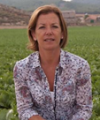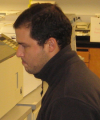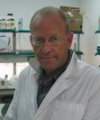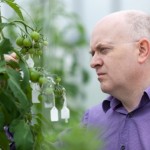Keynote speakers
Bart Nicolaï
Tales from Tomographic Oceans: water transport in fruit and vegetables revisited
 Bart Nicolaï has an MSc in Agricultural Engineering (Ghent University, Belgium) and Applied Mathematics (University of Leuven, Belgium). He obtained a PhD in Applied Biological Sciences in 1994 at the University of Leuven (Belgium) where he now is a full professor. He is responsible for the co-ordination of the scientific research in the Flanders Centre of Postharvest Technology, a public-private partnership which was established by the University of Leuven and the Association of Belgian Horticultural Co-operatives in 1997. Since 2005 he is head of the division Mechatronics, Biostatistics and Sensors (MeBioS) of the Biosystems department at the University of Leuven and also leads the postharvest research group of this division. His main research interests are postharvest biology and technology, refrigeration technology, heat and mass transfer, quality of fruit and vegetables, and mathematical modelling. Bart Nicolaï is past-chairman of the Special Interest Group on Postharvest Processing of the European Association of Agricultural Engineers (EurAgEng), and past president of Commission C2 (Food Science and Engineering) of the International Institute of Refrigeration (IIR-IIF). He has been a member of the organising and/or scientific committees of many international workshops and symposia. He is the author or co-author of 250+ peer reviewed research papers, and is on the editorial board of the journals Postharvest Biology and Technology, Journal of Food Engineering, and Postharvest Innovation and Technology. He has co-ordinated 4 EU research projects and has participated in several others.
Bart Nicolaï has an MSc in Agricultural Engineering (Ghent University, Belgium) and Applied Mathematics (University of Leuven, Belgium). He obtained a PhD in Applied Biological Sciences in 1994 at the University of Leuven (Belgium) where he now is a full professor. He is responsible for the co-ordination of the scientific research in the Flanders Centre of Postharvest Technology, a public-private partnership which was established by the University of Leuven and the Association of Belgian Horticultural Co-operatives in 1997. Since 2005 he is head of the division Mechatronics, Biostatistics and Sensors (MeBioS) of the Biosystems department at the University of Leuven and also leads the postharvest research group of this division. His main research interests are postharvest biology and technology, refrigeration technology, heat and mass transfer, quality of fruit and vegetables, and mathematical modelling. Bart Nicolaï is past-chairman of the Special Interest Group on Postharvest Processing of the European Association of Agricultural Engineers (EurAgEng), and past president of Commission C2 (Food Science and Engineering) of the International Institute of Refrigeration (IIR-IIF). He has been a member of the organising and/or scientific committees of many international workshops and symposia. He is the author or co-author of 250+ peer reviewed research papers, and is on the editorial board of the journals Postharvest Biology and Technology, Journal of Food Engineering, and Postharvest Innovation and Technology. He has co-ordinated 4 EU research projects and has participated in several others.
Mondher Bouzayen
Multi-hormonal control of transcriptional regulation associated with fruit development and ripening
Mondher Bouzayen holds a full Professor position at the University of Toulouse (France) and he is leading the Genomics and Biotechnology of Fruits (GBF) laboratory, a joint unit the and between the National Institute of Agronomical Research (INRA) and the Toulouse National Institute of Polytechnics (INPT). The GBF group has decades experience in the field of fruit research and as such made a substantial contribution to the characterization of ripening associated genes and particularly those involved in ethylene and auxin signaling. The topic of the group deals with the multi-hormonal control of fleshy fruit development with a major focus on developmental transitions underlying fruit set and fruit ripening. The current interest of GBF is on hormone cross-talk during fruit set, development and ripening. Fruit development processes are investigated by unraveling the genomic determinants underlying the fruit quality traits mechanisms. Tomato is the main model system and the GBF group made a major contribution to the generation of generic tools and resources on this model species. M. Bouzayen coordinated a number of national and international programmes and led the French contribution to the tomato genome sequencing project within the international consortium Solanaceae Genome Network (SGN). M. Bouzayen is currently the chair of the European network on fleshy fruit research (COST Action FA1106) which involves groups from 22 different European countries. His research work yielded 92 papers all related to fruit biology, fruit ripening and fruit quality and published in international peer-reviewed journals among which Nature Biotechnology, Nature, PNAS, The Plant Cell, The Plant Journal, Plant Physiology, Trends In Plant Sciences. He is frequently invited as speaker in international meetings (18) and to give lectures in foreign Universities/Institutes (26).
Ian Ferguson
Minor crops – major problems and how they inform postharvest understanding
 Dr Ian Ferguson is Chief Scientist of Plant & Food Research, a world-leading horticulture research organisation. Dr Ferguson has had a long research career, specialising in postharvest science, plant and fruit physiology, biochemistry and biotechnology, particularly in postharvest physiology of disorders and stress responses, fruit genomics, and more latterly systems approaches. He has extensive experience both in fundamental plant and fruit research and in research and development for the NZ horticultural industry. He is Joint Editor-in-Chief of the leading international journal Postharvest Biology & Technology. He is a fellow of the NZ Royal Society, has been a member of many NZ Government funding and science bodies and is a Member of the Order of New Zealand. Dr Ferguson is internationally active as a conference speaker, a member of science and review bodies, and is also involved in international research collaborations, including with Kasetsart University, Bangkok, Thailand, and a more than 10 year collaboration with Zhejiang University, Hangzhou, China, where he has been Guang Biao Visiting Professor.
Dr Ian Ferguson is Chief Scientist of Plant & Food Research, a world-leading horticulture research organisation. Dr Ferguson has had a long research career, specialising in postharvest science, plant and fruit physiology, biochemistry and biotechnology, particularly in postharvest physiology of disorders and stress responses, fruit genomics, and more latterly systems approaches. He has extensive experience both in fundamental plant and fruit research and in research and development for the NZ horticultural industry. He is Joint Editor-in-Chief of the leading international journal Postharvest Biology & Technology. He is a fellow of the NZ Royal Society, has been a member of many NZ Government funding and science bodies and is a Member of the Order of New Zealand. Dr Ferguson is internationally active as a conference speaker, a member of science and review bodies, and is also involved in international research collaborations, including with Kasetsart University, Bangkok, Thailand, and a more than 10 year collaboration with Zhejiang University, Hangzhou, China, where he has been Guang Biao Visiting Professor.
Pietro Tonutti
Storage technology optimization and postharvest stress physiology
 He is currently full professor, responsible for the Post-Harvest labs of Scuola Superiore Sant’Anna (SSSA), one of the three public Universities in Pisa, Italy. He received his PhD in Crop Physiology (1989) from the Faculty of Agriculture – University of Padova (Italy) where, in 1990, he became a Faculty member as a Researcher (1990-1992), then an Associate Professor (1992-2002), and in 2002 he became a Full Professor in Fruit Science. During November 2006 Tonutti then became Professor of Fruit Crop and Postharvest Physiology at SSSA, where he served as the Director of the Research Division (2008-2010) and is now currently Head of the International Relations Office. In addition, Pietro Tonutti has coordinated a number of research projects and is the author of many technical and scientific papers and book chapters in both Italian and English. He is a founding member of the National Postharvest Working Group, active since 1994 within the Italian Society for Horticultural Science (SOI) and the Italian Consortium for Genomics Studies in Rosaceae (ESTree Consortium). In 2004 Professor Tonutti convened the 5th International Society for Horticultural Science (ISHS), Postharvest Symposium in Verona and in 2006 he was elected Chair of the ISHS Quality and Postharvest Horticulture Commission for the period 2006-2010. Prof. Tonutti has been appointed as the expert member of the Horticultural Science sector by the Italian Agency for Research and University Evaluation (ANVUR) and is a member of the Editorial Board of Postharvest Biology and Technology. He has been and currently is involved in several projects dealing with fruit (olives, grapes, peaches, apples) ripening and post-harvest behavior using integrated biochemical and molecular approaches.
He is currently full professor, responsible for the Post-Harvest labs of Scuola Superiore Sant’Anna (SSSA), one of the three public Universities in Pisa, Italy. He received his PhD in Crop Physiology (1989) from the Faculty of Agriculture – University of Padova (Italy) where, in 1990, he became a Faculty member as a Researcher (1990-1992), then an Associate Professor (1992-2002), and in 2002 he became a Full Professor in Fruit Science. During November 2006 Tonutti then became Professor of Fruit Crop and Postharvest Physiology at SSSA, where he served as the Director of the Research Division (2008-2010) and is now currently Head of the International Relations Office. In addition, Pietro Tonutti has coordinated a number of research projects and is the author of many technical and scientific papers and book chapters in both Italian and English. He is a founding member of the National Postharvest Working Group, active since 1994 within the Italian Society for Horticultural Science (SOI) and the Italian Consortium for Genomics Studies in Rosaceae (ESTree Consortium). In 2004 Professor Tonutti convened the 5th International Society for Horticultural Science (ISHS), Postharvest Symposium in Verona and in 2006 he was elected Chair of the ISHS Quality and Postharvest Horticulture Commission for the period 2006-2010. Prof. Tonutti has been appointed as the expert member of the Horticultural Science sector by the Italian Agency for Research and University Evaluation (ANVUR) and is a member of the Editorial Board of Postharvest Biology and Technology. He has been and currently is involved in several projects dealing with fruit (olives, grapes, peaches, apples) ripening and post-harvest behavior using integrated biochemical and molecular approaches.
Carlos Crisosto
Emerging postharvest technologies
 Carlos Crisosto is currentlyFull Pomologist, at University of California, Davis. The focus of his research and extension program is the postharvest biology and technology of fruits, especially peaches, nectarines, plums, apricots, cherries, table grapes, figs, kiwifruits, olives, pomegranates, and persimmons, as well as tree nuts such as pistachios, almonds and walnuts. The goal of his research program is to develop a better understanding of the orchard factors and postharvest factors that control fruit flavor and shelf life and to develop technology to overcome fruit industry problems. He is applying genomic techniques to identify gene(s) responsible for fruit sensory attributes (both desirable and undesirable), and investigating physiological disorders such as chilling injury. He is also using sensory techniques, such as trained panels and “in store” consumer tests, to describe fruit flavor characteristics and losses during postharvest handling.
Carlos Crisosto is currentlyFull Pomologist, at University of California, Davis. The focus of his research and extension program is the postharvest biology and technology of fruits, especially peaches, nectarines, plums, apricots, cherries, table grapes, figs, kiwifruits, olives, pomegranates, and persimmons, as well as tree nuts such as pistachios, almonds and walnuts. The goal of his research program is to develop a better understanding of the orchard factors and postharvest factors that control fruit flavor and shelf life and to develop technology to overcome fruit industry problems. He is applying genomic techniques to identify gene(s) responsible for fruit sensory attributes (both desirable and undesirable), and investigating physiological disorders such as chilling injury. He is also using sensory techniques, such as trained panels and “in store” consumer tests, to describe fruit flavor characteristics and losses during postharvest handling.
Leon Terry
Reducing waste: synergies between biology and supply chain management
 Leon A. Terry is Head of the Plant Science Laboratory at Cranfield University and heads Cranfield Soil and AgriFood Institute with responsibility for over 60 Academic and research staff and 50 research students. The Cranfield Soil and AgriFood Institute is a new institute which combines Cranfield’s existing international strengths in soil science and agri-informatics through the National Soil Resources Institute, with the University’s wealth of expertise in food security. It is uniquely placed within the EU for the breadth of research and postgraduate teaching it carries out. The Institute is the national centre for the investigation of soils within England and Wales and houses the Plant Science Laboratory, one of largest and best equipped postharvest laboratories in the EU.
Leon A. Terry is Head of the Plant Science Laboratory at Cranfield University and heads Cranfield Soil and AgriFood Institute with responsibility for over 60 Academic and research staff and 50 research students. The Cranfield Soil and AgriFood Institute is a new institute which combines Cranfield’s existing international strengths in soil science and agri-informatics through the National Soil Resources Institute, with the University’s wealth of expertise in food security. It is uniquely placed within the EU for the breadth of research and postgraduate teaching it carries out. The Institute is the national centre for the investigation of soils within England and Wales and houses the Plant Science Laboratory, one of largest and best equipped postharvest laboratories in the EU.
Susan Lurie
The use of nondestructive measurements and molecular techniques to determine commodity quality and supply chain management
 Susan Lurie received her Ph.D. in Biology at City University, NY. She was initially appointed as Lecturer at the Hebrew University (1974-1978). In 1980, she moved to the Agricultural Research Organization as a Senior Scientist (Assistant Professor). From 1996 she worked as Research Scientist Aleph (Professor) in the Department of Postharvest Science, at The Volcani Center, Agricultural Research Organization. She has investigated ripening and storage problems of numerous crops including pome and stone fruits, avocados, citrus, peppers and tomatoes. She pioneered the idea that a heat stress can give crops resistance to chilling injury. Her work has been on both applied and basic research aspects of fruit storage. Her current interests include nondestructive measurements to determine fruit quality, systems biology methods to understand chilling injury, and the use of plant growth regulators to affect postharvest quality fruits and vegetables. To date, she has published over 150 research papers (>3000 citations, h-index 29), and over 20 reviews on various aspects of postharvest.
Susan Lurie received her Ph.D. in Biology at City University, NY. She was initially appointed as Lecturer at the Hebrew University (1974-1978). In 1980, she moved to the Agricultural Research Organization as a Senior Scientist (Assistant Professor). From 1996 she worked as Research Scientist Aleph (Professor) in the Department of Postharvest Science, at The Volcani Center, Agricultural Research Organization. She has investigated ripening and storage problems of numerous crops including pome and stone fruits, avocados, citrus, peppers and tomatoes. She pioneered the idea that a heat stress can give crops resistance to chilling injury. Her work has been on both applied and basic research aspects of fruit storage. Her current interests include nondestructive measurements to determine fruit quality, systems biology methods to understand chilling injury, and the use of plant growth regulators to affect postharvest quality fruits and vegetables. To date, she has published over 150 research papers (>3000 citations, h-index 29), and over 20 reviews on various aspects of postharvest.
Mª Isabel Gil
Pre and postharvest strategies to enhance bioactive constituents of fruit and vegetables
 Mabel Gil has a Pharmacy degree and the PhD in Biology. She is a senior researcher at the Food Science and Technology Department at CEBAS-CSIC institute in Murcia, Spain. Her research activities are related to quality and safety of fresh produce, particularly fresh-cut leafy vegetables. She coordinates an expert group involved in fundamental and applied aspects of preharvest and postharvest factors affecting quality and safety of fruits and vegetables. One of their main tasks is the control of microbiological contamination during production, processing and storage. Another important task is the evaluation of the effect of different agronomic, genetic and technological factors on the phytochemical content. She is the leader of many R&D projects with companies as well as European and National Research Programs. She collaborates with national and international groups.
Mabel Gil has a Pharmacy degree and the PhD in Biology. She is a senior researcher at the Food Science and Technology Department at CEBAS-CSIC institute in Murcia, Spain. Her research activities are related to quality and safety of fresh produce, particularly fresh-cut leafy vegetables. She coordinates an expert group involved in fundamental and applied aspects of preharvest and postharvest factors affecting quality and safety of fruits and vegetables. One of their main tasks is the control of microbiological contamination during production, processing and storage. Another important task is the evaluation of the effect of different agronomic, genetic and technological factors on the phytochemical content. She is the leader of many R&D projects with companies as well as European and National Research Programs. She collaborates with national and international groups.
Beth Mitcham
Assuring the quality of cherries after harvest with special reference to sensorial attributes

Beth Mitcham received a Ph.D. in Horticulture from the University of Maryland. She joined the University of California at Davis in 1992, and currently serves as Director of the Postharvest Technology Center and as Associate Director of the Horticulture Collaborative Research Program, promoting horticulture in developing countries. Dr. Mitcham leads an applied and fundamental research program focused on improving the quality of fruit for US consumers and the viability of the California produce industry. She works closely with the fruit industry in California to develop strategies for maintaining postharvest quality of fruit, especially apples, sweet cherries, pears, berries, pomegranates and nut crops.
Ariel Vicente
Progress in cell wall metabolism and texture of cherry fruit
 Agronomic Engineer University of La Plata, Master in Plant Biology University of California Davis USA, PhD in Biochemistry University of La Plata, Argentina. Postdoctoral Scholar University of Agronomic Engineer University of La Plata, Master in Plant Biology University of California Davis USA, PhD in Biochemistry University of La Plata, Argentina. Postdoctoral Scholar University of California Davis USA. Current positions: Assistant Professor University of La Plata Argentina and Independent Researcher of CONICET, Argentina. Author of several publications in Postharvest Technology, Food Sciences and Biochemistry. Member of the Editorial Board of Journal of Experimental Botany, UK. Reviewer for more than 30 Journals in the areas of Postharvest Technology, Plant Biology and Food Science. His group is interested in the evaluation of cell wall metabolism of fruits and vegetables associated with fruit ripening or storage disorders. His work also deals with the evaluation of hormonal and UV-C, ozone and heat treatments to reduce spoilage, maintain quality and prevent physiological disorders in fruits and vegetables.
Agronomic Engineer University of La Plata, Master in Plant Biology University of California Davis USA, PhD in Biochemistry University of La Plata, Argentina. Postdoctoral Scholar University of Agronomic Engineer University of La Plata, Master in Plant Biology University of California Davis USA, PhD in Biochemistry University of La Plata, Argentina. Postdoctoral Scholar University of California Davis USA. Current positions: Assistant Professor University of La Plata Argentina and Independent Researcher of CONICET, Argentina. Author of several publications in Postharvest Technology, Food Sciences and Biochemistry. Member of the Editorial Board of Journal of Experimental Botany, UK. Reviewer for more than 30 Journals in the areas of Postharvest Technology, Plant Biology and Food Science. His group is interested in the evaluation of cell wall metabolism of fruits and vegetables associated with fruit ripening or storage disorders. His work also deals with the evaluation of hormonal and UV-C, ozone and heat treatments to reduce spoilage, maintain quality and prevent physiological disorders in fruits and vegetables.
Peter Toivonen
Integrated analysis for improving export of sweet cherries and how a small industry can compete by focusing on premium quality
 Peter Toivonen is a Postharvest Physiologist working with Agriculture and Agri-Food Canada at the Pacific Agri-Food Research Centre in Summerland, British Columbia, Canada since 1989. He has had responsibility over a varied series of research topics ranging from vegetables, to small fruits, fresh-cut fruits and vegetables and tree fruits (sweet cherries, apples, and stone fruits). Dr. Toivonen is the current vice-chair for the Commission Quality and Postharvest Horticulture (2010-2014) in the International Society for Horticultural Science. He is also active in two USDA Regional Project groups; 1) S294 – Quality and Safety of Fresh-cut Fruits and Vegetables, and 2) NE1036 – Postharvest Physiology of Tree Fruits. His current research activities are; 1) implications of wound-associated metabolism on the microbial safety of fresh-cut vegetables, 2) phenotyping of new apple and sweet cherry cultivars for postharvest characteristics, and 3) logistics and quality management of sweet cherries destined for containerized sea shipment. Dr. Toivonen also has interest in development of non-destructive approaches to monitoring quality in fruits and vegetables. He is always open to discussing potential collaborations with international colleagues.
Peter Toivonen is a Postharvest Physiologist working with Agriculture and Agri-Food Canada at the Pacific Agri-Food Research Centre in Summerland, British Columbia, Canada since 1989. He has had responsibility over a varied series of research topics ranging from vegetables, to small fruits, fresh-cut fruits and vegetables and tree fruits (sweet cherries, apples, and stone fruits). Dr. Toivonen is the current vice-chair for the Commission Quality and Postharvest Horticulture (2010-2014) in the International Society for Horticultural Science. He is also active in two USDA Regional Project groups; 1) S294 – Quality and Safety of Fresh-cut Fruits and Vegetables, and 2) NE1036 – Postharvest Physiology of Tree Fruits. His current research activities are; 1) implications of wound-associated metabolism on the microbial safety of fresh-cut vegetables, 2) phenotyping of new apple and sweet cherry cultivars for postharvest characteristics, and 3) logistics and quality management of sweet cherries destined for containerized sea shipment. Dr. Toivonen also has interest in development of non-destructive approaches to monitoring quality in fruits and vegetables. He is always open to discussing potential collaborations with international colleagues.
Daniel Valero
Recent developments to maintain overall sweet cherry quality during postharvest storage
 Daniel Valero is currently Professor of the Department of Food Technology at the University Miguel Hernández (UMH), Spain. Dr. Valero received his BSc in 1997 and MSc with Honours from the Faculty of Pharmacy at the University of Granada, Spain in 1988. He got a PhD Fellowship at the Centro de Edafología y Biología Aplicada del Segura (CEBAS-CSIC) and graduated as PhD in Plant Biology at the University of Granada, Spain, with qualification “Apto cum laude” in 1993. He received a Post-Doc position at the Long Ashton Research Station, University of Bristol 1994-1995. At his present position at Universidad Miguel Hernández, he is engaged in teaching, conducting research, and supervising graduate and PhD students in Postharvest Technology. He is the leader of the “Postharvest Fruits and Vegetables Group” at the UMH. Dr. Valero has a broad research background with more than 70 peer-reviewed papers in the last 20 years as a specialist in Postharvest Technology of Fruits and Vegetables, holding 1 patent, as well as being the author of many chapters in books edited by Spanish and International Editorials. Recently, he published the Book Postharvest Biology and Technology for Preserving Fruit Quality, by Boca Raton: CRC-Taylor & Francis (2010). He also serves as a reviewer of Research projects for the Spanish Ministry of Science and Technology, the European Commission (VI Frame work), the International Foundation for Science (Sweden), Agencia Nacional de Promoción Científica y Tecnológica (Argentina) and Binational Agricultural Research and Development Fund (BARD, USA-Israel). Dr. Valero is reviewer for more than 40 International Journals within the areas of Food Science and Technology, Agriculture and Plant Biology of the JCR and a member of the Editorial board of the Journals: Postharvest Biology & Technology, Spanish Journal of Agricultural Research (Associate Editor Section Postharvest), Journal of Applied Horticulture, and Journal of Food Agriculture & Environment.
Daniel Valero is currently Professor of the Department of Food Technology at the University Miguel Hernández (UMH), Spain. Dr. Valero received his BSc in 1997 and MSc with Honours from the Faculty of Pharmacy at the University of Granada, Spain in 1988. He got a PhD Fellowship at the Centro de Edafología y Biología Aplicada del Segura (CEBAS-CSIC) and graduated as PhD in Plant Biology at the University of Granada, Spain, with qualification “Apto cum laude” in 1993. He received a Post-Doc position at the Long Ashton Research Station, University of Bristol 1994-1995. At his present position at Universidad Miguel Hernández, he is engaged in teaching, conducting research, and supervising graduate and PhD students in Postharvest Technology. He is the leader of the “Postharvest Fruits and Vegetables Group” at the UMH. Dr. Valero has a broad research background with more than 70 peer-reviewed papers in the last 20 years as a specialist in Postharvest Technology of Fruits and Vegetables, holding 1 patent, as well as being the author of many chapters in books edited by Spanish and International Editorials. Recently, he published the Book Postharvest Biology and Technology for Preserving Fruit Quality, by Boca Raton: CRC-Taylor & Francis (2010). He also serves as a reviewer of Research projects for the Spanish Ministry of Science and Technology, the European Commission (VI Frame work), the International Foundation for Science (Sweden), Agencia Nacional de Promoción Científica y Tecnológica (Argentina) and Binational Agricultural Research and Development Fund (BARD, USA-Israel). Dr. Valero is reviewer for more than 40 International Journals within the areas of Food Science and Technology, Agriculture and Plant Biology of the JCR and a member of the Editorial board of the Journals: Postharvest Biology & Technology, Spanish Journal of Agricultural Research (Associate Editor Section Postharvest), Journal of Applied Horticulture, and Journal of Food Agriculture & Environment.
Mario Pezzotti
Systems biology approach to interpret the „appassimento“ technology in grapevine“
 Dr. Mario Pezzotti is a professor at University of Verona (Italy) with expertise in grapevine functional genomics and systems biology, specifically berry ripening and withering. He contributed to the release of the first draft of the grapevine genome by participating in the French–Italian public consortium for grapevine genome characterization and was responsible for the applied projects translating the genome knowledge. He is also co-responsible for the Functional Genomic Centre of the University of Verona where the most advanced transcriptomic platforms are available to study gene expression in grapevine. He uses an integrated approach (transcriptomic, proteomics and metabolomics) to understand the complex interplay between the environment and berry quality.
Dr. Mario Pezzotti is a professor at University of Verona (Italy) with expertise in grapevine functional genomics and systems biology, specifically berry ripening and withering. He contributed to the release of the first draft of the grapevine genome by participating in the French–Italian public consortium for grapevine genome characterization and was responsible for the applied projects translating the genome knowledge. He is also co-responsible for the Functional Genomic Centre of the University of Verona where the most advanced transcriptomic platforms are available to study gene expression in grapevine. He uses an integrated approach (transcriptomic, proteomics and metabolomics) to understand the complex interplay between the environment and berry quality.
Graham Seymour
The genetic and epigenetic basis of fruit ripening – science discovery into commercial practice
 Graham B. Seymour is currently Professor of Plant Biotechnology amd Head of Plant and Crop Science Division, School of Biosciences at University of Nottingham. Professor Seymour has worked on the biochemistry, molecular biology and genetics of fruit ripening for the last 30 years, mainly using tomato as a model system. His major scientific contributions to this field include identifying, with Ken Manning, the gene at the tomato Cnr locus, an epigenetic lesion in a master regulator governing ripening. Also with colleagues at Imperial College, SCRI and TGAC, he has played a leading role in the UK contribution to the International Tomato Genome Sequencing Project. His major research focus is now the genetic and molecular basis of fruit texture and the role of the epigenome in regulating fruit ripening.
Graham B. Seymour is currently Professor of Plant Biotechnology amd Head of Plant and Crop Science Division, School of Biosciences at University of Nottingham. Professor Seymour has worked on the biochemistry, molecular biology and genetics of fruit ripening for the last 30 years, mainly using tomato as a model system. His major scientific contributions to this field include identifying, with Ken Manning, the gene at the tomato Cnr locus, an epigenetic lesion in a master regulator governing ripening. Also with colleagues at Imperial College, SCRI and TGAC, he has played a leading role in the UK contribution to the International Tomato Genome Sequencing Project. His major research focus is now the genetic and molecular basis of fruit texture and the role of the epigenome in regulating fruit ripening.
Serge Delrot
Pre- and post-harvest ripening of grape berry: the missing links
 After a master in plant physiology and a master in biochemistry, his PhD work dealt with phloem loading and long distance transport of assimilates in broad bean. Later on, this led him to characterize sugar and amino acid transporters using isolated plasma membrane vesicles from sugar beet, and to develop functional studies of these transporters by yeast complementation. In parallel, he did some work on the systemic transport of pesticides. He started to work on grapevine in 1996, with the aim to characterize the sugar transporters of grape berry and their regulation. In 2006, he moved from the University of Poitiers, where all previous work was done, to the University of Bordeaux. Since 2006, he is director of the laboratory «Ecophysiology and grape functional genomics » (University/INRA) and the scientific director of the Institute of Grape and Wine Sciences (ISVV) which covers all fields concerned by grape and wine research (viticulture, oenology, grapevine diseases and protection, economy, marketing, social sciences). His lab investigates rootstock/scion interactions and the response of berry composition to the environment. He has supervised about 20 Ph.D thesis, co-authored about 140 articles in peer-reviewed journals and co-edited 2 books. He serves in the editorial board of the Australian Journal of Grape and Wine Research, Plant Molecular Biology Reporter and Journal of Experimental Botany. He has served as Keynote speaker in more than 80 conferences and/or seminars.
After a master in plant physiology and a master in biochemistry, his PhD work dealt with phloem loading and long distance transport of assimilates in broad bean. Later on, this led him to characterize sugar and amino acid transporters using isolated plasma membrane vesicles from sugar beet, and to develop functional studies of these transporters by yeast complementation. In parallel, he did some work on the systemic transport of pesticides. He started to work on grapevine in 1996, with the aim to characterize the sugar transporters of grape berry and their regulation. In 2006, he moved from the University of Poitiers, where all previous work was done, to the University of Bordeaux. Since 2006, he is director of the laboratory «Ecophysiology and grape functional genomics » (University/INRA) and the scientific director of the Institute of Grape and Wine Sciences (ISVV) which covers all fields concerned by grape and wine research (viticulture, oenology, grapevine diseases and protection, economy, marketing, social sciences). His lab investigates rootstock/scion interactions and the response of berry composition to the environment. He has supervised about 20 Ph.D thesis, co-authored about 140 articles in peer-reviewed journals and co-edited 2 books. He serves in the editorial board of the Australian Journal of Grape and Wine Research, Plant Molecular Biology Reporter and Journal of Experimental Botany. He has served as Keynote speaker in more than 80 conferences and/or seminars.
Arnaud Bovy
Elucidating the genetic basis of fruit quality in tomato
Arnaud Bovy obtained a PhD in Biology in 1993 at Utrecht University (Netherlands). Since 1993 he has been working as a researcher at Wageningen University and Research Centre in Wageningen (Netherlands). Currently he is heading a research group on ‘Breeding for Quality’ within the Department of Plant Breeding. He has ca 20 years experience in leading research projects carried out in collaboration with academic and industrial partners. These projects all fall within a major theme aimed at understanding the genetics and molecular basis of consumer quality traits, such as flavour, nutritional value, colour and firmness in crop plants. Main focus is on Solanaceous crops such as tomato and pepper and Rosaceous crops such as apple and strawberry. His team uses integrated multi-disciplinary approaches, combining genetic, X-omics and metabolic engineering strategies, to unravel complex multifactorial traits such as flavour and nutritional value. A. Bovy led the tomato program of the Dutch genomics initiative Centre for Biosystems Genomics, which ended by December 2012. This program focussed on elucidating the molecular genetic and biochemical basis of tomato flavour. Highlights of this program include a detailed insight in the genetic loci and metabolic pathways underlying flavour characteristics, the elucidation of a novel mechanism to determine the release of flavour-related volatiles through differential glyco-conjugation of their immediate precursors and contribution to the sequencing of the tomato genome. To date, A. Bovy has published more than 70 papers in international peer reviewed journals and is frequently invited to give lectures at international meetings and foreign universities.


